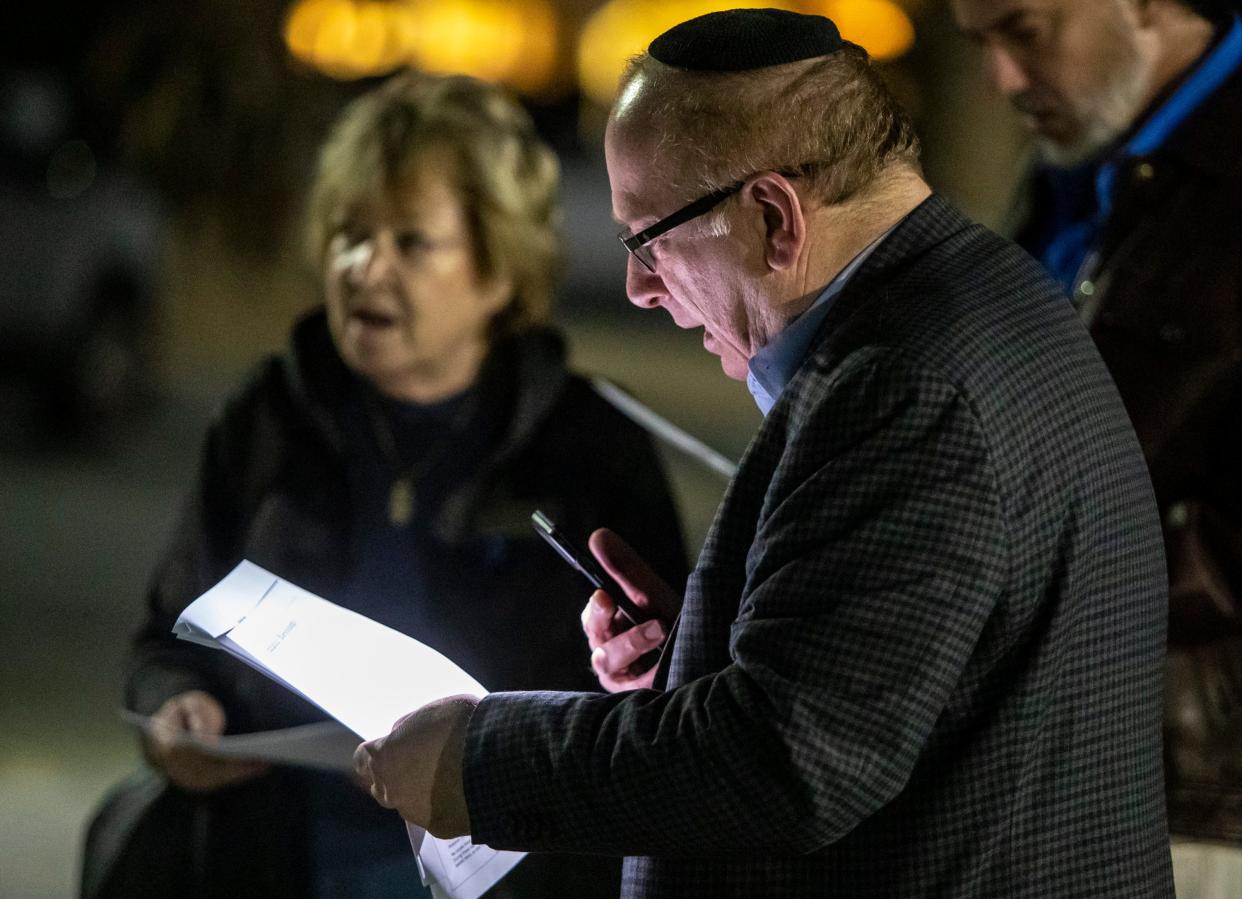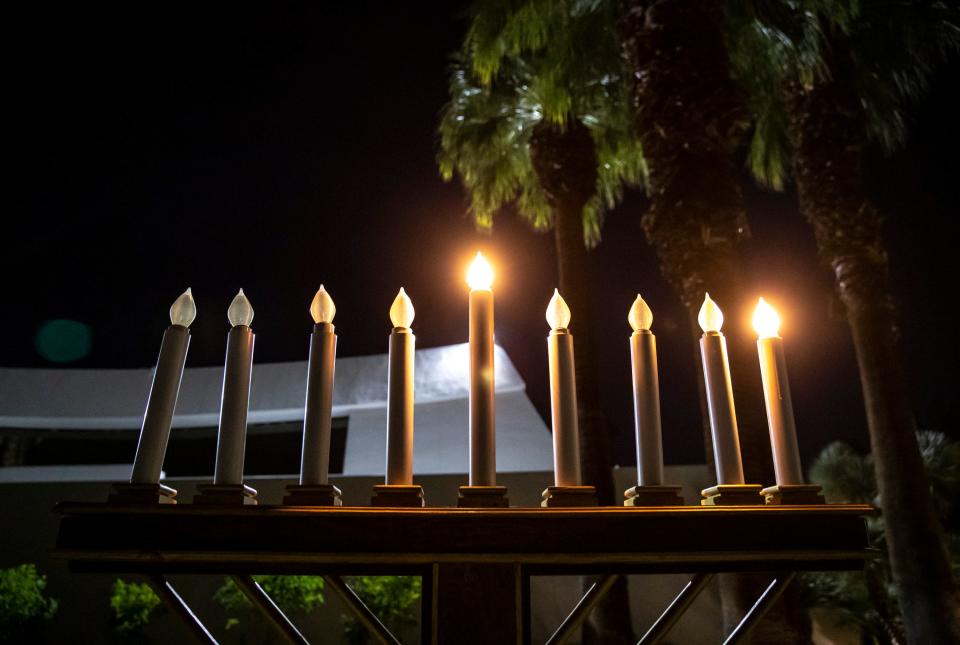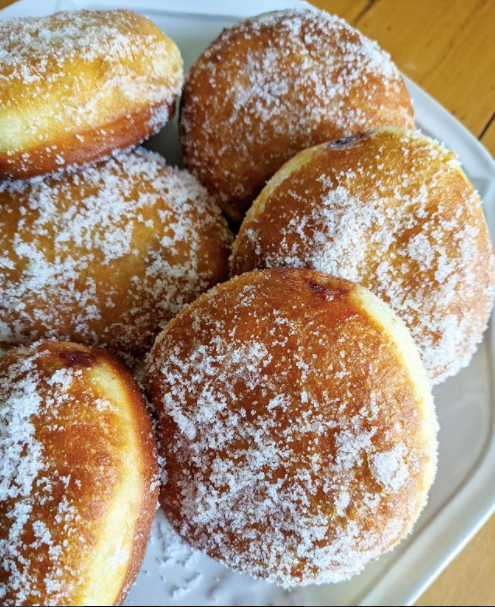Temple Isaiah rabbi says ‘We’re not going to take our menorahs down’ for Hanukkah

Rabbi Steven Rosenberg has noticed two troubling things the Jewish community is facing ahead of Hanukkah this year: fear and anger.
Rosenberg, who serves Temple Isaiah in Palm Springs, told The Desert Sun that the holiday feels different amid the Israel-Hamas war. Antisemitic incidents in the U.S. have risen 400% since October, and Rosenberg said it's the first time in his 37 years as a Rabbi that he's had congregants express fear about putting menorahs up in their windows.
This year, Hanukkah runs from sundown Thursday to sundown on Dec. 15.
"I've told my colleagues and my congregation, 'we do not run away from terrorism,'" Rosenberg said. "I was a Rabbi in Long Island during 9/11, we didn't run away then, and we're not going to do it here. We're not going to take our menorahs down, we're going to display them in our windows, which is our custom."

"Hanukkah" is Hebrew for "dedication." Although the holiday is popularly known as the Festival of Lights, it is also the festival of rededication, meant to honor the victory of the Macabee soldiers over the Syrian Greek army. According to the The Hebrew Bible, in their victory, the Judah-led Macabees reclaimed the holy temple in Jerusalem and rededicated it to God. They had only enough oil to ignite the temple light for one night, and yet the light burned for eight days.
In the Jewish faith, this instance is referred to as the miracle of Hanukkah. A candle on the menorah, or hanukkiah, is lit each night to mimic the one that burned in the holy temple so many years ago.
"The Hanukkah story is one of a subjugated people that rose up against its oppressors and said 'We're not going to fade away.' It's about reclaiming and being proud of who you are, standing up and saying, 'This is who I am, I am unafraid, I am proud of who I am, what my background is, what my faith is, and my culture.' We will celebrate that," Rosenberg said.
A 1993 hate crime in Billings, Montana spurred a movement that Rosenberg hopes Coachella Valley locals will join this year. A brick was thrown through a bedroom window of 5-year-old Isaac Schnitzer, who was displaying a menorah for Hanukkah. In response, The Billings Gazette printed a full-page image of a menorah, and thousands in the community posted it in their own windows as a symbol of solidarity. This has become a national movement known as Project Menorah.
"If non-Jews want to show a sign of universal tolerance, put a candle or menorah up in your window," Rosenberg said. "I would hope this year that our non-Jewish friends and neighbors might offer a sense of support and let their Jewish friends know they respect, encourage and embrace them to put their menorahs up, and have a sense of love instead of hate."
Latkes, sufganiyot and 'Jewpardy'
Although the holidays come from two separate religions and have two different meanings, Christmas and Hanukkah do have some similarities in bringing families together, exchanging gifts, charity or service to others and more. Rosenberg said that gifts is an "American thing you don't see in a lot of other countries" and mostly for children, but that many families enjoy gifting each other chocolate coins known as "gelt."
For those who enjoy fried foods, Hanukkah is the perfect holiday. Jewish celebrants will often cook potato pancakes known as latkes throughout the holiday, serving them at times with apple sauce or sour cream, but Rosenberg said "I eat them with ketchup." Another traditional dish is a jelly donut, or sufganiyot.
"Since the story revolves around the miracle of light and one of the legends that when they rebuilt the temple, they had to find an oil that lasts for one day, but it lasted for eight days, so a lot of the foods are oily," Rosenberg said. "You talk to anyone who grew up in a Jewish home and latkes are something we consume a lot of. Latkes are different than hash browns, they look alike but it's a different recipe."

Another honored tradition involves the game of dreidel, in which a four-sided top is spun. Each side is painted with a Hebrew letter. Whichever face it lands on, it instructs players to add or remove coins from a poker-style pot. Rosenberg described it as "a lot of fun," but mentioned another game Jewish families play that's a take on the popular game show "Jeopardy!" known as "Jewpardy."
"It's the same way 'Jeopardy!' is, but it's all about Jewish stuff. It was a computer program that someone created many years ago and they got permission from Sony, who owns the rights to use it, but I think it even goes back further to when Merv Griffin owned the show," Rosenberg said.
Even though it's a minor holiday on the Jewish calendar, Hanukkah is arguably the most famous Jewish holiday worldwide. TV commercials acknowledge the celebration every winter, and the Hallmark Channel has included films such as "Hanukkah On Rye," "Mistletoe and Menorahs" and "Love, Lights, Hanukkah!" in its Christmas season marathon.
While speaking of his favorite Hanukkah memories, Rosenberg said "it's a fun holiday, especially for the kids."
"There's a tradition of each child having their own menorah. When my kids were small, one of the things I loved watching was turning off all the lights, lighting all the menorahs and seeing the glow of the flames on their face. To me, that was my gift. I thought that was beautiful and it's a picture that's deeply engraved in my memory because it's something we did together as a family."
Previous reporting by USA TODAY was included in this report.
Desert Sun reporter Brian Blueskye covers arts and entertainment. He can be reached at brian.blueskye@desertsun.com or on Twitter at @bblueskye.
This article originally appeared on Palm Springs Desert Sun: Palm Springs rabbi encourages ‘universal tolerance’ this Hanukkah

